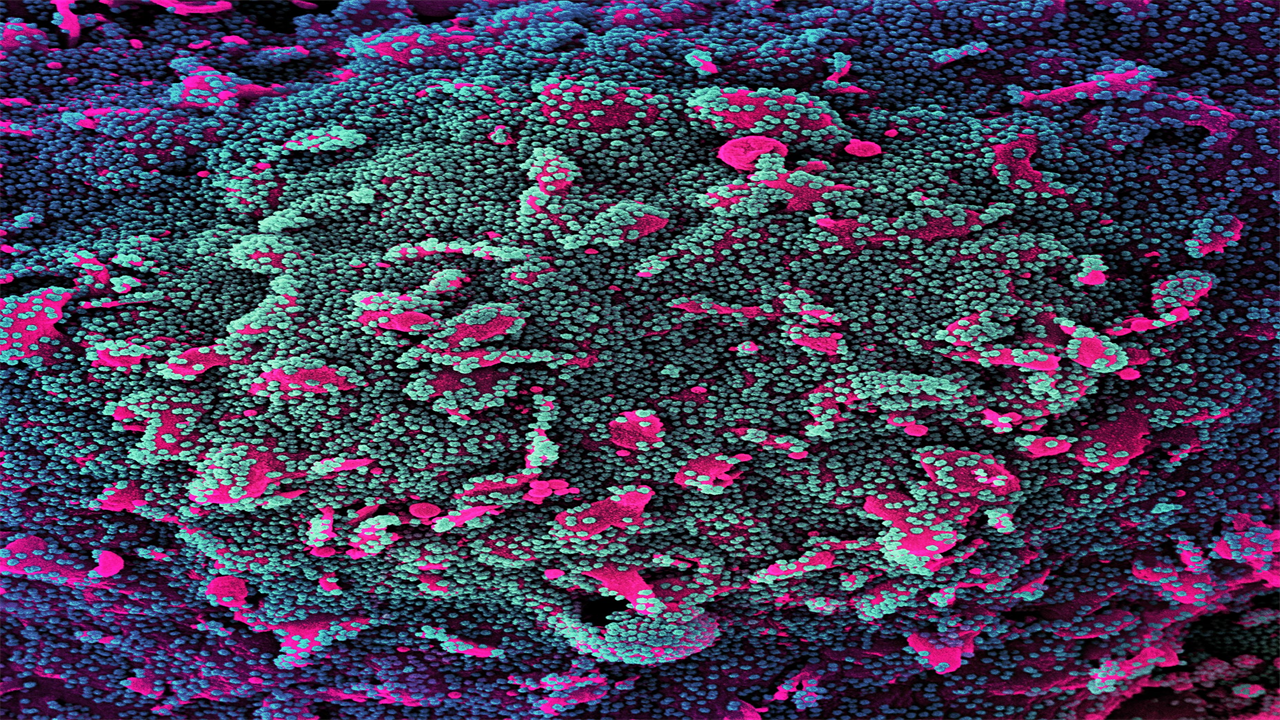UCLA Breakthrough Points Way to Longer-Lasting COVID Vaccine
0 View
Share this Video
- Publish Date:
- 11 December, 2021
- Category:
- Covid
- Video License
- Standard License
- Imported From:
- Youtube
Tags

Microscope image of a human cell (pink) heavily infected with SARS-CoV-2 virus particles (green and purple). Credit: NIAID/NIH
Researchers at the Eli and Edythe Broad Center of Regenerative Medicine and Stem Cell Research at UCLA have identified rare, naturally occurring T cells capable of targeting a protein found in SARS-CoV-2 and a range of others. coronaviruses.
The findings suggest that a component of this protein, called viral polymerase, could potentially be added to COVID-19 vaccines to create a longer-lasting immune response and increase protection against new variants of the virus.
Most COVID-19 vaccines use some of the spike protein found on the surface of the virus to prompt the immune system to make antibodies. However, newer variants – such as delta and omicron – carry mutations to the spike protein, making them less recognizable by the immune cells and antibodies stimulated by vaccination. Researchers say it will likely require a new generation of vaccines to create a more robust and broader immune response capable of beating current variants and those that may emerge in the future.
One way to achieve this is to add a fragment of another viral protein to vaccines — a fragment that is less susceptible to mutations than the spike protein and will activate the immune system’s T cells. T cells are equipped with molecular receptors on their surface that recognize foreign protein fragments called antigens. When a T cell encounters an antigen that recognizes its receptor, it replicates itself and produces additional immune cells, some of which target infected cells and kill them immediately and others that remain in the body for decades to fight that same infection should it fail. ever return.
The researchers focused on the viral polymerase protein, which is found not only in SARS-CoV-2 but also in other coronaviruses, including those that cause SARS, MERS and the common cold. Viral polymerases serve as engines that coronaviruses use to make copies of themselves, allowing infection to spread. Unlike the spike protein, viral polymerases are unlikely to change or mutate even as viruses evolve.
To determine whether the human immune system has T cell receptors capable of recognizing viral polymerase, the researchers exposed blood samples from healthy human donors (collected prior to the COVID-19 pandemic) to the viral polymerase antigen. They found that certain T cell receptors did indeed recognize the polymerase. They then used a method they developed called CLINt-Seq to genetically sequence these receptors. Next, the researchers engineered T cells to carry these polymerase-targeted receptors, allowing them to study the receptors’ ability to recognize and kill SARS-CoV-2 and other coronaviruses.
More than 5 million people worldwide have died from COVID-19. Current vaccines offer significant protection against serious disease, but as new, potentially more contagious variants emerge, researchers recognize that vaccines may need updating — and the new UCLA findings point towards a strategy that could help improve protection and immunity. increase in the long term. The researchers are now conducting further studies to evaluate viral polymerase as a possible new vaccine component.
The study was published online Dec. 9, 2021 in the journal Cell Reports.
Reference: “HLA-A*02:01 restricted T cell receptors against the highly conserved SARS-CoV-2 polymerase cross-reacting with human coronaviruses” by Pavlo A. Nesterenko, Jami McLaughlin, Brandon L. Tsai, Giselle Burton Sojo, Donghui Cheng , Daniel Zhao, Zhiyuan Mao, Nathanael J. Bangayan, Matthew B. Obusan, Yapeng Su, Rachel H. Ng, William Chour, Jingyi Xie, Yan-Ruide Li, Derek Lee, Miyako Noguchi, Camille Carmona, John W. Phillips , Jocelyn T. Kim, Lili Yang, James R. Heath, Paul C. Boutros, and Owen N. Witte, Dec. 9, 2021, Cell Reports.
DOI: 10.116/j.celrep.2021.110167
Pavlo Nesterenko, a UCLA graduate student, is the study’s lead author; the corresponding author is Dr. Owen Witte, who holds the presidential chair in developmental immunology in the UCLA Department of Microbiology, Immunology, and Molecular Genetics and founding director emeritus of the Broad Stem Cell Research Center. A full list of co-authors is available in the journal.
The research was supported by the Parker Institute for Cancer Immunotherapy, a Ruth L. Kirschstein Institutional National Research Service Award from the National Institutes of Health, and the UCLA WM Keck Foundation COVID-19 Research Award Program.










